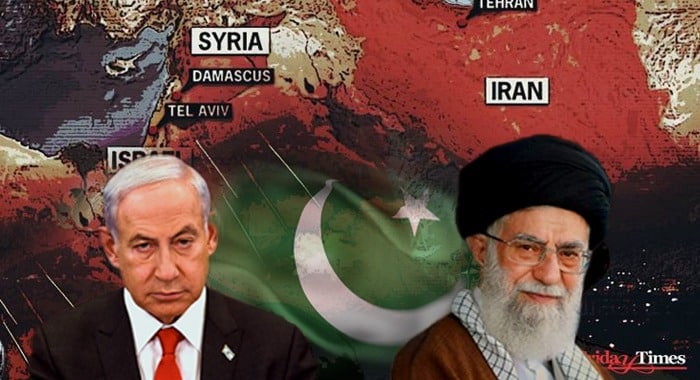The recent escalation in tensions between Iran and Israel has reignited a debate long simmering beneath the surface of regional politics, one that directly threatens Pakistan’s geopolitical stability. Beneath the missile strikes and targeted assassinations lies a deeper agenda: the orchestration of regime change, a cornerstone of American foreign policy used for decades to realign global power in favour of Western interests. If Iran falls to this playbook, Pakistan may find itself the next pawn in a high-stakes regional game.
Washington’s preference for regime change has a long, bloody history. Where outright war proves too costly, the U.S. has relied on engineered internal strife, proxy militias, economic sanctions, and covert operations to topple unfriendly governments. From the CIA-led 1953 coup against Iran’s democratic leader Muhammad Mossadegh to the violent overthrow of Iraq’s Saddam Hussein, Libya’s Gaddafi, and covert interventions in Syria, Chile, and Afghanistan, America’s fingerprints are found in every corner of the globe where power resists alignment with its agenda.
The current Israeli offensive against Iran’s nuclear infrastructure, though justified in the name of preemptive self-defence, cannot be seen in isolation. It is part of a wider strategy to weaken Iran’s regional posture, sow internal chaos, and, ultimately, pave the way for a Western-friendly leadership. A regime in Tehran that bends to U.S. and Israeli security interests would radically transform the political landscape of the region, potentially isolating China and Russia, dismantling resistance networks, and undermining sovereign Muslim nations.
For Pakistan, this shift would be disastrous.
If Iran is destabilised or a pro-Western government takes root in Tehran, Pakistan will be caught in a two-front squeeze. To the east, India, already armed with Israeli drones, missile defence systems, and surveillance technologies, poses a persistent threat. If the west also becomes a conduit for Western interests, Islamabad will face the spectre of strategic encirclement.
This would not merely be a matter of geopoliticsm, it would manifest physically and immediately. Pakistan’s restive Balochistan region, already vulnerable to separatist movements, could become the front-line of a renewed insurgency. Iran’s own Baloch and Pashtun populations might be used as tools to stir unrest across the border, creating pressure from within at a time when the country can least afford it.
Moreover, any effort to install a Western-backed regime in Iran will directly endanger the China-Pakistan Economic Corridor (CPEC), a linchpin of Beijing’s Belt and Road Initiative and a critical economic lifeline for Islamabad. American strategic planning has long aimed at weakening China’s access to land trade routes, and what better way to achieve this than by turning Iran and Afghanistan into unstable or Western-aligned territories?
Such developments would hinder China’s logistical reach into the Middle East, Central Asia, and beyond, compromising Pakistan’s most important strategic alliance in the process.
The current landscape is already precarious. Internally, Pakistan faces political infighting, economic stress, and social polarisation. Externally, it is up against hostile alliances, India’s growing military intimacy with Israel and America’s deep-rooted global influence chief among them. If Iran’s fall clears the path for direct Israeli or Western covert access to Pakistan’s western border, the threat matrix will become far more complex, and dangerous.
Now is not the time for Islamabad to stand by idly or react with rhetorical outrage. This is a moment for strategic re-calibration.
First, Pakistan must strengthen diplomatic engagement with Iran. Ideological and sectarian differences must take a backseat to geopolitical realism. A stable, independent Iran is in Pakistan’s national interest, regardless of internal disagreements.
Second, economic partnerships with China must be expanded beyond infrastructure. Intelligence cooperation, cyber-security frameworks, and joint military drills should become routine, not exceptional. China must be engaged as a long-term partner in regional stability, not just a financier.
Third, Pakistan’s national defence posture must be upgraded to include non-conventional threats: information warfare, sabotage, internal subversion, and proxy militias. The playbook used against Libya, Syria, and now potentially Iran may well be deployed against Pakistan, albeit under different justifications.
Finally, political unity is paramount. National leaders must resist the temptation of foreign-backed power plays. If Pakistan’s domestic politics remains a battlefield for foreign interests, the door opens wider for destabilisation.
The warning signs are clear. Iran’s struggle is not just its own. It is a testing ground, a model in motion. Should it collapse or concede, the ripple effects will reach Pakistan’s borders, politically, economically, and militarily.
Regime change in Iran isn’t just about Tehran’s sovereignty. It’s a marker of what lies ahead for nations unwilling to bow to the Western-led global order. For Pakistan, the time to act strategically, without emotion or delay, is now. Otherwise, it may soon find itself fighting battles that were never of its choosing, but entirely of its ignoring.





